仁爱八年级上unit4知识点总结.
八年级上册英语仁爱版unit4知识点

八年级上册英语仁爱版unit4知识点Unit4主要涉及的教学内容包括名词所有格、不定代词、情态动词“must”、“might”和“could”等。
下面会依次详细介绍这些知识点。
1. 名词所有格名词所有格即表示某个名词所拥有的东西。
在英语中,通常在名词后面加上“’s”来表示所有格。
如果名词是以“s”结尾,则只需加上一个“’”,如下所示:- My sister’s book (我妹妹的书)- The students’ uniforms (学生们的制服)- James’ car (詹姆士的车)当名词是某个国家或城市等团体名词时,表示所有格时需要在该名词后面加上“of”,如下所示:- The capital of China (中国的首都)- The history of America (美国的历史)2. 不定代词不定代词通常在句子中作主语、宾语或表语等。
它们没有具体指代的对象,如下所示:- Something (某些东西)- Anything (任何事情)- Nothing (没有任何东西)除此之外,不定代词还包括everybody、someone、anyone、nobody等,在句子中作主语或宾语,如下所示:- Everybody loves ice cream (每个人都喜欢吃冰激凌)- Someone is knocking at the door (有人在敲门)- Anyone can join the club (任何人都可以加入这个俱乐部)- Nobody knows the answer (没有人知道答案)3. 情态动词“must”、“might”和“could”情态动词可以表示说话人对某些事情的看法、推测与义务等。
在Unit4中主要介绍了“must”、“might”和“could”。
- must“must”表示有义务或必须做某事,也可表示根据某些信息得出的推断。
- You must turn off the lights when you leave the classroom. (离开教室时必须关灯)- He must be very tired. (他一定很累了)- might / could“might”和“could”都表示推测或猜测某件事情的可能性,但“might”表示可能性比“could”稍微弱一点。
仁爱英语八年级上册unit 4的知识点

仁爱英语八年级上册unit 4的知识点Unit 4是仁爱英语八年级上册的一个重要单元,本单元的主题是“地球村”,主要内容包括国际会议、计划和国际组织等。
在学习本单元之前,建议学生们先了解一些有关国家、地图和文化的基础知识。
在这篇文章中,我们将介绍本单元的主要知识点及其重点内容。
一、重点词汇1. conference: 会议2. organization: 组织3. charity: 慈善机构4. global: 全球的5. pollution: 污染6. poverty: 贫穷7. famine: 饥荒8. treaty: 条约9. alliance: 联盟10. epidemic: 流行病二、重点句型1. We must take action to solve environmental problems.2. The United Nations is an international organization promoting cooperation among nations.3. A treaty is an agreement between two or more countries.4. The World Health Organization is a specialized agency of the United Nations that is concerned with international public health.5. The Red Cross is an international humanitarian organization providing assistance during conflicts and disasters.三、重点内容1. 国际会议本单元将介绍几种国际组织和会议,主要包括联合国、世界贸易组织、世界卫生组织和气候变化公约。
仁爱英语八年级(上册)Unit4总复习

Which do you like better, plants or animals?
like … better 更喜欢…… I like apples better. I like cats best. like … best 最喜欢…… I like bananas best.
3. A: Do you like the countryside? B: Yes, / I like it very much / because / the air is fresher, the sky is bluer/ and the rivers are clearer there.
I think the sheep are the __ni_c_e_st__ of all. The pigs must be the _f_a_tt_e_s_t_ and _la_z_ie_s_t__ animals on the farm.
What’s the strongest animals on the farm ?
Topic 1 What’s the strongest animal on the farm?
What can we see in the countryside?
sheep some sheep
What can we see in the countryside?
goose
some geese
be important to sb.
We share the same world with them.
share … with … 与……分享…… Eg: They are sharing a piece of long bread.
They often share beautiful music with each other.
仁爱版八年级英语上册 Unit 4 Topic 3重点知识点总结

仁爱版八年级英语上册Unit 4 Topic 3重点知识点总结一,词组:1,shop online=shop on the Internet网上购物2,face to face面对面3,on the website在网络上4,do some shopping购物5,and so on等等6,chat with与某人聊天7,find out找出,查明8,come into being形成,产生9,in the 1960s在20 世纪60年代10,make ...into use把...投入使用11,more and more important12,make sb do sth使某人做某事13,make sb +职业:选取某人做谋职业14,let sb (not) do sth让某人(不)做某事15,ask sb (not)to do sth要求某人(不)做某事16,see sb doing看到某人正在做某事17,learn to cook学习烹饪18,photos of Mars火星照片19,put...into把...放进20,be sure确信21,search for寻找22,look up查阅23,lose oneself in沉迷于.....24,a part of...的一部分25,all kinds of不同种类的26,share...with...与...分享...27,make friends with与...交朋友28, spend...doing sth花时间做某事29,correct grammar纠正语法30,change...into...把...转变成...二,重点句子:1,I am doing some shopping on the Internet.我在网上购物。
2,What else can you do?你还会做其他什么?3,I can also chat with my grandmother face to face.我也可以面对面和我的奶奶聊天。
仁爱英语八年级上Unit 4重点句型归纳应用

仁爱英语八年级上Unit 4必背重点句型Unit 4 Our WorldTopic1 What’s the strongest animal on the farm?1.I like it because the air is fresher, he sky is bluer and the rivers are clearer.我喜欢(乡下),因为空气更清新,天空更蔚蓝,河流更清澈。
仿句:我认为老虎比狮子强壮。
_____________________________________________________________ 2.I think roses are the nicest of all the flowers.我觉得玫瑰花是所有花中最漂亮的。
仿句:猪是这些动物中最丑的。
_____________________________________________________________ 2. I like cats best because they are cuter than other animals.我最喜欢猫因为它们比其它的动物都可爱。
仿句:John比其他男生都高。
_____________________________________________________________ 4.But they have less and less land to live on.但是现在他们只有越来越少的土地居住。
仿句:在夏天,天气变得越来越热。
_____________________________________________________________ 5. Which do you like better, plants or animals?你比较喜欢哪个,植物或者动物?I like plants better. 我比较喜欢植物。
Topic 2 Topic 2 How can we protect ourselves from the earthquake?1.A terrible earthquake struck Qinhai. 一场严重的地震侵袭了青海。
年秋季仁爱英语八年级上册Unit4topic2重点知识点总结及练习

八年级上册Unit 4 Our worldTopic 2 How can we protect ourselves from the earthquake?一.重点句型:Section A1.A terrible earthquake struck Qinghai.一场可怕的地震袭击了青海。
strike意为“侵袭,爆发”,过去式struck。
The lightning struck again. 雷电再次闪击。
2.Many buildings fell down.Some people died and many people are missing. 许多建筑倒塌,很多人死亡,还有许多人失踪。
fall down 倒塌,跌倒,下落;I fell down and hurt my knee. 我摔倒弄伤了膝盖。
3. And I know that there were anther two terrible earthquakes in China. 我还直到发生在中国的另外两次严重的地震。
another意为:“又一,再一,另一(事物或人)”,后面可接单数名词、数字加复数的名词。
another + 数字+ 复数名词= 数字+more +复数名词;Would you like another apple?你想再来一个苹果吗?another 3 hours = 3 more hours 另外三个小时;4. I’m very sorry to hear that. 听到这个消息很遗憾。
表达听者难过、同情或抱歉的心情。
此句是表示关心的句子。
-----I have a bad cold today. 今天我得了重感冒。
----- I’m very sorry to hear that. 听到这个消息很遗憾。
5. I think the Wenchuan earthquake in 2008 was more serious than this one,but theTangshan earthquake in 1976 was the most serious. 我认为2008年的汶川地震比这个地震要严重,但是1976年的唐山大地震是最严重的。
仁爱英语八年级上册英语unit4知识点总结
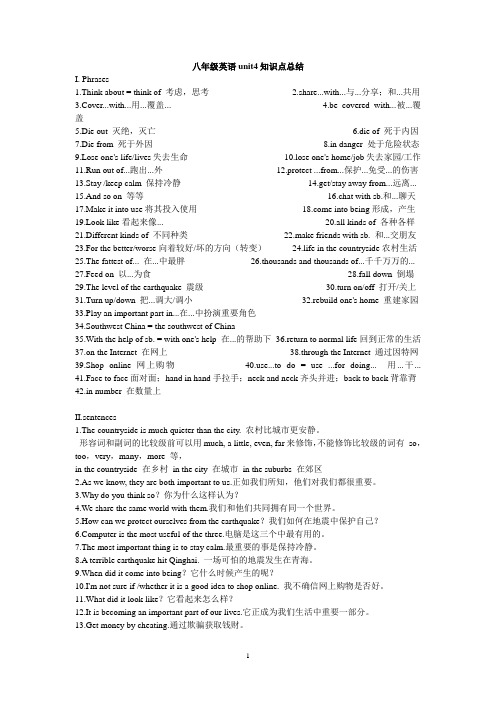
八年级英语unit4知识点总结I. Phrases1.Think about = think of 考虑,思考2.share...with...与...分享;和...共用3.Cover...with...用...覆盖...4.be covered with...被...覆盖5.Die out 灭绝,灭亡6.die of 死于内因7.Die from 死于外因8.in danger 处于危险状态9.Lose one's life/lives失去生命10.lose one's home/job失去家园/工作11.Run out of...跑出...外12.protect ...from...保护...免受...的伤害13.Stay /keep calm 保持冷静14.get/stay away from...远离...15.And so on 等等16.chat with sb.和...聊天17.Make it into use将其投入使用e into being形成,产生19.Look like看起来像... 20.all kinds of 各种各样21.Different kinds of 不同种类22.make friends with sb. 和...交朋友23.For the better/worse向着较好/坏的方向(转变)24.life in the countryside农村生活25.The fattest of... 在...中最胖26.thousands and thousands of...千千万万的...27.Feed on 以...为食28.fall down 倒塌29.The level of the earthquake 震级30.turn on/off 打开/关上31.Turn up/down 把...调大/调小32.rebuild one's home 重建家园33.Play an important part in...在...中扮演重要角色34.Southwest China = the southwest of China35.With the help of sb. = with one's help 在...的帮助下36.return to normal life回到正常的生活37.on the Internet 在网上38.through the Internet 通过因特网39.Shop online 网上购物e...to do = use ...for doing... 用...干...41.Face to face面对面;hand in hand手拉手;neck and neck齐头并进;back to back背靠背42.in number 在数量上II.sentences1.The countryside is much quieter than the city. 农村比城市更安静。
仁爱版八年级上册unit4知识点

仁爱版八年级上册unit4知识点八年级上册unit4主要讲述了有关“时尚”的话题。
本文将从以下三个方面介绍本单元的主要知识点:单词及词组、语法知识以及文化常识。
一、单词及词组1. fashion(时尚):指一种流行的风尚、态度、风格或行为。
2. trend(趋势):指在一定时期内主导或普遍流行的模式或偏好。
3. outfit(装备或衣着):指一整套衣服或饰品。
4. accessory(饰品):指用来补齐或美化装扮的小饰物。
5. match(搭配):指合理地组合或配对衣服、饰品等物品。
6. coordinate(协调):指让不同的衣服、鞋子、包等互相搭配起来,一起构成一种完美的形象。
7. style(风格):指时尚的流行风格或个人风格。
8. brand(品牌):指出产某种产品的公司或商标。
二、语法知识1. 情态动词:可以表达说话人的态度、意见、建议、请求、批评、情感等。
例如:should、would、could等。
2. 动词时态:主要有简单现在时、一般过去时、现在进行时、过去进行时、一般将来时、被动语态等多种形式。
在描述过去发生的事情时,通常使用一般过去时;在描述正在进行的动作时,使用现在进行时等。
3. 名词性从句:是指在主句中用名词性词语(如what, who, whom, which, whose等)引导的一个完整的句子,它在句中担任名词的作用。
例如:“I don't know what style is popular this year.”(我不知道今年什么风格流行。
)4. 形容词和副词的比较级和最高级:在表达比较时,需要使用形容词和副词的比较级和最高级形式。
例如:trendy(时髦)-trendier(更时髦)-trendiest(最时髦)。
三、文化常识1. 不同地区的时尚风格:不同地区的人们有着不同的时尚风格,例如巴黎、米兰、伦敦的时尚风格各有千秋。
2. 时尚品牌的认知:时尚品牌的认知很重要,它可以代表着消费者对自身品味和身份的诉求。
仁爱英语八年级上册Unit4-topic3知识点总结
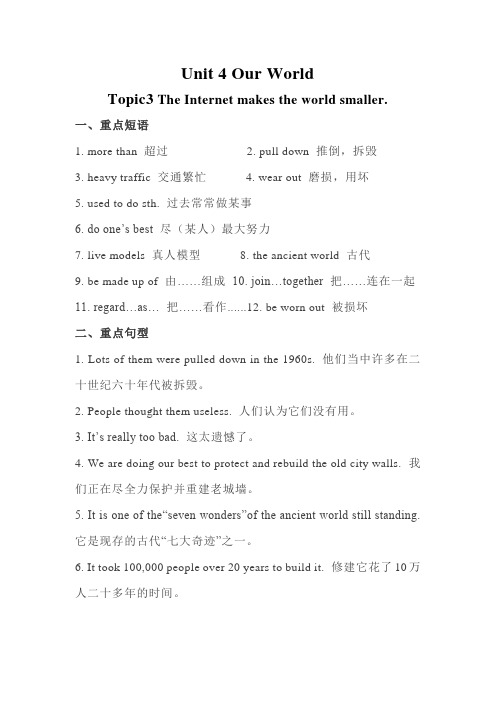
Unit 4 Our WorldTopic3 The Internet makes the world smaller.一、重点短语1. more than 超过2. pull down 推倒,拆毁3. heavy traffic 交通繁忙4. wear out 磨损,用坏5. used to do sth. 过去常常做某事6. do one’s best 尽(某人)最大努力7. live models 真人模型8. the ancient world 古代9. be made up of 由……组成10. join…together 把……连在一起11. regard…as… 把……看作......12. be worn out 被损坏二、重点句型1. Lots of them were pulled down in the 1960s. 他们当中许多在二十世纪六十年代被拆毁。
2. People thought them useless. 人们认为它们没有用。
3. It’s really too bad. 这太遗憾了。
4. We are doing our best to protect and rebuild the old city walls. 我们正在尽全力保护并重建老城墙。
5. It is one of the“seven wonders”of the ancient world still standing. 它是现存的古代“七大奇迹”之一。
6. It took 100,000 people over 20 years to build it. 修建它花了10万人二十多年的时间。
7. Since then, people regarded the Great Wall as a symbol of the Chinese nation. 从那以后,人们就把长城看作是中华民族的象征。
仁爱版八年级上册英语 Unit 4 Our World 单元知识点总结
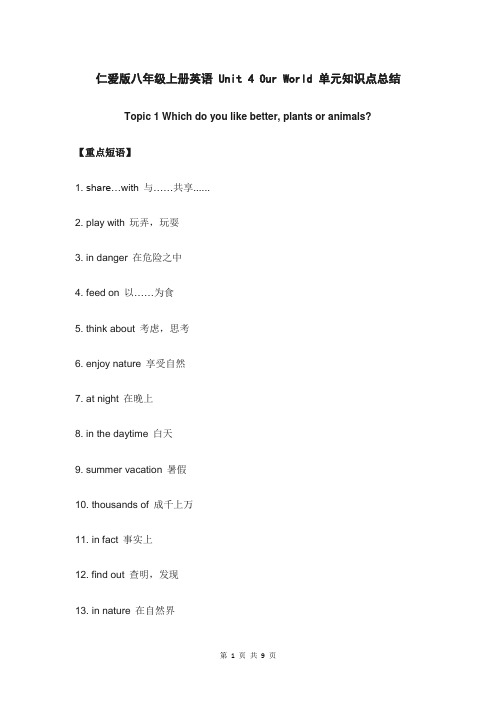
仁爱版八年级上册英语 Unit 4 Our World 单元知识点总结Topic 1 Which do you like better, plants or animals?【重点短语】1. share…with 与……共享......2. play with 玩弄,玩耍3. in danger 在危险之中4. feed on 以……为食5. think about 考虑,思考6. enjoy nature 享受自然7. at night 在晚上8. in the daytime 白天9. summer vacation 暑假10. thousands of 成千上万11. in fact 事实上12. find out 查明,发现13. in nature 在自然界【重点句型】1. Plants are more beautiful than animals. 植物比动物更漂亮。
2. The plants stay green longer there. 那儿的植物能更长时间保持绿色。
3. The rainforests are very important to us. 雨林对我们很重要。
4. Water is necessary for all plants. It is the most important thing to all living things, we must save every drop of water. 水对所有植物是必需的。
它对所有生物都重要,我们必须节约每一滴水。
5. Isn’t it interesting? 是不是很有趣呀?6. It is one of the most dangerous fish in the world. 它是世界上最危险的鱼之一。
7. It is so strange! 太奇怪了!【重点语法】一. 形容词的比较级和最高级的构成1. 规则变化:(1)一般在词尾加—er或—est,如:fresh—fresher—freshest(2)以字母e结尾的形容词,加r或st,如:late—later—latest(3)以重读闭音节结尾的词,词尾只有一个辅音字母时,应双写这一辅音字母,再加er或est,如:big—bigger—biggest(4)以辅音字母+y结尾的双音节词,先改y为i,再加er 或est,如:happy—happier—happiest(5)部分双音节词和多音节词前面加more或most构成比较级或最高级。
仁爱版八年级上册英语-Unit4:Topic2单词汇总+知识梳理
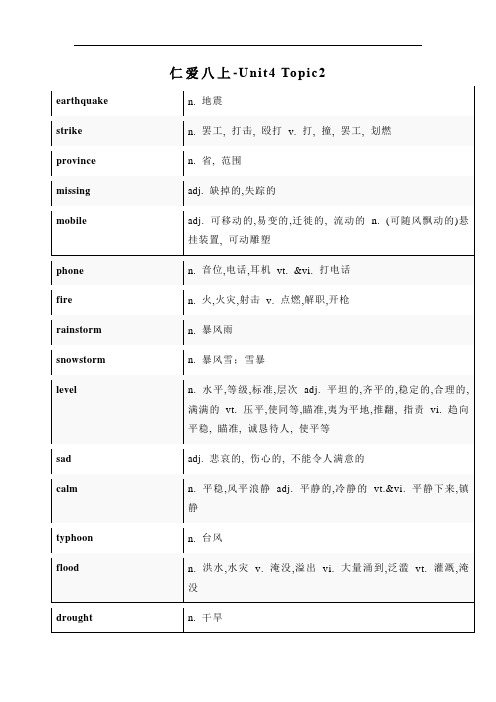
仁爱八上-Unit4 Topic2【重点短语】1.fall down 倒塌,跌倒2.another+数词+名词复数=数词+more+名词复数再……,又……e.g another two days = two more days再两天,又两天3.lose one’s lives/homes失去某人生命/家园4.protect…from…保护……免受……5..the number of ……的数量a number of 许多,大量6.hear about 听说7.run out of 逃出……8.stay/keep calm 保持冷静9.take a/the lift 乘电梯10.stay/keep/get away from 远离…11.remember to do sth.记得要去做某事remember doing sth. 记得做过某事12.b e careful 小心13.t here will be/there is/are going to be 将会有14.t urn off/ on关闭,打开15.r ebuild one’s homes重建家园16.r eturn to normal life 返回正常生活【词形转换】1.missing adj.失踪的,找不到的,丢失的,缺少的miss v.思念,错过2.sad adj.伤心的,悲伤的sadness n.悲伤3.build v.建造building n.建筑物rebuild v.重建,重组,使复原4.appear v.出现,显现,出场appearance n.外貌,出现5.injured adj.受伤的,有伤的injure 损害,毁坏,伤害【重点句型】1.I think the mobile phone is more useful than the telephone.我认为手机比电话更有用。
2.But the computer is the most useful of the three.但是电脑在这三个中是最有用的。
新版仁爱英语八年级上UNIT4短语总结,课文翻译,语法

UNIT4 TOPIC 1Section A1、 which do you like better ,plants or animals ?动物植物你更喜欢那个?2、 think about 思考考虑3、 life in the countryside 生活在农村4、 the beauty of nature 自然之美5、 live in the city 住在城市6、 I go there for my summer holiday every year 我每年暑假去那里度假7、 That must be fun 。
那一定很有趣8、 on the farm 在农场9、 I think the sheep are the nicest of all .我认为羊是最好看的。
10、 chat with sb. 和某人聊天11、 run after 追,跟跑12、 play with sb./ sth. 与。
玩13、 live a happy life 过着幸福的生活14、 I don’t think so .我不那样认为。
15、 he is lazier than me .他比我懒16、 I like animals better . 我更喜欢动物SECTION B17、 keep a pet dog18、 why do you think so ? 你为什么那么认为?19、 make sb. happy 使某人快乐20、 I think roses are the nicest of all the flowers .我认为玫瑰是所有花中最美的。
21、 sing to sb. 对。
唱歌22、 both。
and 两者都。
23、 both plants and animals 动物和植物都。
24、 as we know 众所周知25、 be important to sb. 对某人来说很重要26、 share with sb. 和某人共同分享27、 the same world 同一个世界28、 I like frogs better because they are more useful .我比较喜欢哇,因为他们更有用Section C1、 thick forests 茂密的森林2、 Rainforests are thick forests in the hot parts of the world.热带雨林是地球上热带的茂密森林。
仁爱英语八年级上册Unit4topic3重点知识点总结及练习

仁爱英语八年级上册Unit4topic3重点知识点总结及练习八年级上册Un it4OurworldTopic 3 The Internet makes the world smaller.一.重点句型:Sectio n A1. It ' s a littleheaper.它会便宜一点儿。
Will you come a little earlier n ext time? 你下次可以来早一点儿吗?2. What else can you do online? 你在网上还可以做什么?Do you want something else? 你还要其他什么东西吗?」can also chat with my gran dmother face to face. 我还可以和我的奶奶面对面地聊天。
(1) chat with sb.和某人交谈;I ofte n chat with my best friend on pho ne. 我打电话和我的好朋友聊天。
⑵face to face 面对面地;类似的结构:n eck and n eck 齐头并进;hand in ha nd 手拉手;back to back 背对背;4. Let me find out the in formation on li ne. 让我在网上查些资料。
find out是个短语动词,表示搞清楚”、弄明白”的意思,而且是经过研究、计算、探询等获知,得知。
*Please help me to find out what time the train leaves.请帮我查明火车出发的时间。
At last , I found it.最后,我找到它了。
C. look for寻找;表示寻找"的过程和动作。
I ' m looking for my pen.我正在寻找我的钢笔。
5. The In ternet makes the world smaller. 因特网使世界变小。
八年级上册仁爱英语知识点 unit4

八年级上册仁爱英语知识点 unit4八年级上册仁爱英语知识点——unit4在八年级上册仁爱英语中,我们学习了unit4的知识点。
本文将对这些知识点进行详细的介绍和总结。
1. 名词的单数和复数形式在英语中,有很多名词是可以直接在单数形式后加上-s来表示复数的,如boy变为boys,girl变为girls。
但是也有很多名词的复数形式并不是这样直接规律的,需要我们记忆和理解。
2. be 动词的用法be 动词有三种时态:现在时态、过去时态和将来时态。
在英语语法中,be动词用于表示主语的状态或性质,比如I am happy (我很开心)。
3. 现在进行时现在进行时表示现在正在进行的动作,其结构为be(am/is/are)+现在分词(-ing)。
如:I am watching TV(我正在看电视)。
4. 祈使句祈使句是用来表达命令、建议或请求的句子,常用动词不带to。
如:Open the window(开窗户)。
5. 过去时态的用法过去时态用于表示已经完成的动作或状态,其结构为动词过去式。
如:I went to the park yesterday(我昨天去了公园)。
6. 疑问句英语中有两种疑问句——一般疑问句和特殊疑问句。
一般疑问句需要借助be动词或助动词来组成,如:Are you a teacher?(你是老师吗?);特殊疑问句则需要使用特殊疑问词来引导,如:What is your name?(你叫什么名字?)。
7. 情态动词情态动词表示说话人对于某种事物或动作的态度、情感或推测,包括can、could、may、might、must、shall、should、will、would 等。
8. 不规则动词有些动词的过去式和过去分词形式并不是加上-ed,而是需要单独记忆,比如:go的过去式是went,过去分词是gone。
9. 数量词和限定词数量词用于表达特定的数量,包括one、two、three等;限定词则用于限定名词的数量、品质和位置,包括a、an、the、my、his、her等。
仁爱版八年级上册u4知识点

仁爱版八年级上册u4知识点仁爱版八年级上册u4是讲解“get to know me!”的。
这一单元是介绍自己的单元,也是让学生能够更好的理解如何与他人沟通交流的单元。
一、重点词汇1. introduction n. 介绍2. personal adj. 个人的3. identity n. 身份4. background n. 背景5. experience n. 经历6. personality n. 个性7. hobby n. 爱好8. preference n. 偏好9. involve v. 涉及10. share v. 分享11. interact v. 交流12. communicate v. 沟通二、句式表达1. What’s your name?你叫什么名字?2. Where are you from?你来自哪里?3. What do you look like?你是什么样子的?4. What do you like to do?你喜欢做什么?5. What’s your favorite subject?你最喜欢的科目是什么?6. What are your hobbies?你的爱好是什么?7. What are your pets?你养了哪些宠物?8. Do you involve in any after-school activities?你参加过任何课外活动吗?9. What’s your personality like?你的性格是怎样的?10. Do you have any siblings?你有兄弟姐妹吗?三、社交技巧1. 眼神交流当我们与他人沟通时,要保持眼神交流,表现出自信,利于建立良好的人际关系。
2. 姿态姿势是交流时的重要元素。
站姿、坐姿,都要有姿态,让别人对我们有好的印象。
3. 时时微笑微笑能给他人带来光明和温暖,可以让别人觉得和我们交往很舒适。
四、学习建议1. 提高口语能力在完成语言学习时,要加强口语方面的练习,提高句子连贯和表达准确度。
仁爱八年级上unit4知识点总结

Unit 4Topic1一.重点词语1.share…with 与……共享2.play with 玩弄, 玩耍3.in danger 在危险之中4.feed on 以……为食5.think about 考虑, 思考6.enjoy nature 享受自然7.at night 晚上8.in the daytime 白天9.summer vacation 暑假10.thousands of 成千上万11.in fact 事实上12.find out 查明, 发现13.in nature 在自然界二.重点句型1.Plants are more beautiful than animals. 植物比动物更漂亮。
2.The plants stay green longer there. 那儿的植物能更长时间保持绿色。
3.The rainforests are very important to us. (热带)雨林对我们很重要。
4.Water is necessary for all plants.It is the most important thing to all living things,we must save every drop of water. 水对所有植物是必需的。
它对所有生物都重要, 我们必须节约每一滴水。
5.Isn’t it interesting?是不是很有趣呀?6.It is one of the most dangerous fish in the world. 它是世界上最危险的鱼之一。
7.It is so strange!太奇怪了!三.语法学习(一.)形容词的比较级和最高级的构成规则变化:(1.)一般在词尾加—er或—est.如: fresh—fresher—freshest.(2.)以字母e结尾的形容词, 加r或st,如: late—later—latest.(3.)以重读闭音节结尾的词, 词尾只有一个辅音字母时, 应双写这一辅音字母, 再加er 或est.如: big—bigger—biggest.(4.)以辅音字母+y结尾的双音节词, 先改y为i, 再加er 或est.如:happy—happier —happiest.(5.)部分双音节词和多音节词前面加more或most构成比较级或最高级。
仁爱版八年级英语上册Unit 4 Topic 1 重点知识点总结

仁爱版八年级英语上册Unit 4 Topic 1 重点知识点总结一,词组:1,the beauty of nature自然之美2,think about考虑3,life in the countryside农村生活4,much quieter安静得多5,go to...for holiday去...度假6,on the farm在农场上7,chat with与...聊天8,run after追赶9,play with与...玩10,live a happy life过着幸福的生活11,make sb happy使某人开心12,both...and...两者都13,as we know众所周知14,share with与...分享15,be important to sb对某人重要15,be important for sth对某事重要16,thick forests茂密的森林17be covered with被...覆盖18,on the earth=on Earth在地球上19,the surface of...的表面20,thousands of 成千上万的21,control the climate控制气候22,die out灭绝23,feed on喂养24,less and less 越来越少25,be in danger处于危险中26,provide sb with sth=provide sth for sb为某人提供某物27,nowhere else没有其他地方28,hold the water涵养水源29,keep sb/sth doing使某人或某物一直做30,keep sb/sth+adj使某人或某物处于...状态31,different kinds of不同种类32,play an important part in doing sth在某方面扮演着重要角色33,kill sth for sth为了某物而杀害某物二,重点句子:1,what are you thinking about?你正在想什么?----I am thinking about life in the countryside.我正在想农村的生活。
仁爱英语八年级上册Unit 4 知识要点
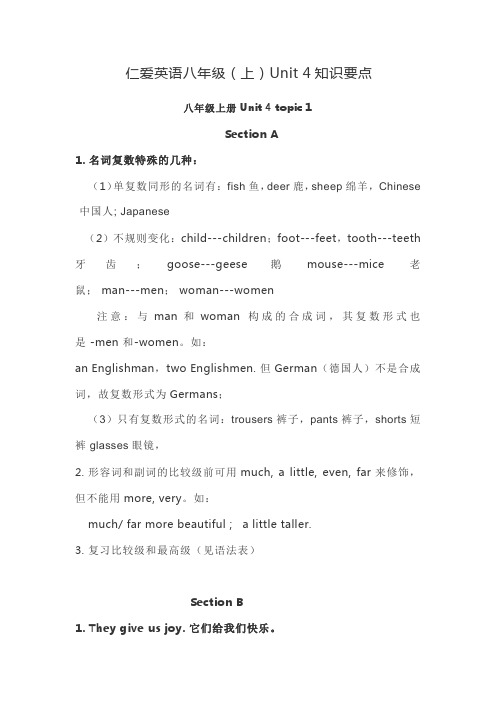
仁爱英语八年级(上)Unit 4知识要点八年级上册Unit 4 topic 1Section A1. 名词复数特殊的几种:(1)单复数同形的名词有:fish鱼,deer鹿,sheep绵羊, Chinese 中国人; Japanese(2)不规则变化:child---children;foot---feet,tooth---teeth 牙齿;goose---geese 鹅mouse---mice老鼠; man---men; woman---women注意:与 man 和 woman构成的合成词,其复数形式也是 -men 和-women。
如:an Englishman,two Englishmen. 但German(德国人)不是合成词,故复数形式为Germans;(3)只有复数形式的名词:trousers裤子,pants裤子,shorts短裤 glasses眼镜,2. 形容词和副词的比较级前可用much, a little, even, far 来修饰,但不能用more, very。
如:much/ far more beautiful ; a little taller.3. 复习比较级和最高级(见语法表)Section B1. They give us joy. 它们给我们快乐。
give us joy = give us happiness/pleasure (joy= happiness= pleasure 表快乐,都是名词 )2.We share the world with them.share sth. with sb. 与某人分享某物,如:I want to share my happiness with you.3.Insects feed on plants.①feed on 以…为食;Tigers feed on meat.②live on 以食…为生:We live on rive③feed 喂: My job is to feed animals.Section C1.Rainforests cover 6% of the earth’s surface.(1)cover 覆盖;(2) cover…with…, 用…覆盖…,如:He covered his face with a newspaper.(3)be covered with…被…覆盖:The land is covered with snow.2. Thousands and thousands of animals live in rainforests. thousands of 成千上万的…thousands and thousands of 千千万万的(比前者更多)3.They also help to control the climate.control the climate 控制气候4.They can’t live without water.Without没有,是介词,后不能接句子,只接名词,动名词或代词。
- 1、下载文档前请自行甄别文档内容的完整性,平台不提供额外的编辑、内容补充、找答案等附加服务。
- 2、"仅部分预览"的文档,不可在线预览部分如存在完整性等问题,可反馈申请退款(可完整预览的文档不适用该条件!)。
- 3、如文档侵犯您的权益,请联系客服反馈,我们会尽快为您处理(人工客服工作时间:9:00-18:30)。
Unit 4 Topic1一. 重点词语1. share …with 与 .... 共享2. play with 玩弄,玩耍3. in danger 在危险之中4. feed on 以……为食5. think about 考虑,思考6. enjoy nature 享受自然7. at night 晚上8. in the daytime 白天9. summer vacation 暑假 10. thousands of 成千上万 11. in fact 事实上 12. find out 查明,发现 13. in nature 在自然界 二. 重点句型1 . P Iants are more beautiful than animals.2 .The pla nts stay gree n Ion ger there.3 .The rain forests are very importa nt to us.4 .Water is necessary for all plants.lt is the most important thing to all livingthings,we must save every drop of water. 水对所有植物是必需的。
它对所有生物都重要,我们必须节约每一滴水。
5 .Isn ' t it interesting? 是不是很有趣呀?6 .It is one of the most dangerous fish in the world. 它是世界上最危险的鱼之一。
7 .It is so strange ! 太奇怪了!三. 语法学习 (一 . )形容词的比较级和最高级的构成1 . 规则变化:(1.) 一般在词尾加一 er 或一est.女口: fresh — fresher — freshest. (2. )以字母 e 结尾的形容词,加 r 或 st, 如: late —later —latest.(3. )以重读闭音节结尾的词,词尾只有一个辅音字母时,应双写这一辅音字母,再加 er或 est. 如: big — bigger — biggest.( 4. ) 以 辅 音 字 母 + y 结 尾 的 双 音 节 词 , 先 改 y 为 i , 再 加 er 或 est. 如 : happy — happier — happiest. (5.)部分双音节词和多音节词前面加 more 或most 构成比较级或最高级。
如口: careful — more2 . 不规则变化:植物比动物更漂亮。
那儿的植物能更长时间保持绿色。
(热带)雨林对我们很重要。
careful — most careful,beautiful—more beautiful— most beautiful.good/well —better —best,little —less —least,many/much —more—most,bad/ill —wors e—worst,far —farther/further —farthest/furthest.(二. )形容词的比较级和最高级的用法1 .比较级AvE或A>E,经常与than搭配,或给出比较的二个内容。
可用much和alittle 修饰.2.三者或三者以上比较用最高级,一般给出比较范围•如:(1)例句:①I ' m happier than you. 我比你更快乐。
② Pla nts are much more beautiful tha n ani mals.Do you like plants or animals?What are you thinking about?Why do you think so?What kind of wild animal is the most dangerous,the tiger,the snake or the bear?Why must we save every drop of water?Topic 2. 重点词语1.take the place of 代替,取代2.instead of 代替,而不是…3.mistake …for…把……错当4.seem to do 好象,似乎5.call for 要求6.wake sb. up 将某人叫醒7.see sb.doing sth. 看见某人正在做某事e sth. for sth./doing sth. 利用某物做某事9.spend …。
n…在... 上花费时间或金钱10.be sure of 确信11.these days 现在,目前12.in alphabetical order 按字母表顺序排列13.look up 查阅14.pay attention to 注意,专心15.begin with以…开始16.and son on 等等17.switch on 开(电灯,机器等)18.ask ( sb. ) for sth. 向……要……•重点句型of (in )+…。
(2 )例句:① The boy is the tallest in my class.② Less on Two is the most importa nt of all. 这个男孩是我们班最高的。
第二课是所有中最重要的。
植物比动物漂亮的多。
四. 交际用语:学习如何用英语描述和谈论我们生存的自然环境1. I ' m sure robots can do some work better than humans. 我确信机器人比人能更好地做某些工作。
2. I saw a UFO while I was walking down the street yesterday. 昨天我沿着街道走时,看见了一个不明飞行物。
3. It looked like a plate. 它看上去像一个盘子。
4. Until now,even the scientists are not sure whether there are UFO. 直到现在,甚至科学家也不确信是否有不明飞行物。
5. We can shop without going out of our houses. 我们不出家门就能购物。
6. We can use the Internet for finding a job. 我们可以用网络来找工作。
7. We shouldn' t sp end too much time on it. 但是我们不应该在因特网上面花费太多的时间。
8. When you look up a word in the dictionary,pay attention to the first letter of the word. 当你在字典里查一个单词的时候,注意这个单词的第一个字母。
三. 语法学习 (一. )现在进行时与过去进行时的区别:1.现在进行时表示现在正在发生或正在做的事情,基本结构be +现在分词。
如:肯定句:The robots are making a car now. 这些机器人正在生产小汽车。
否定句:We are not studying on the Internet. 我们没有在互联网上学习。
疑问句:Is the teacher looking up the word in the dictionary ?这个老师正在词典中查这个词吗?特殊疑问句:W ho am I talking to ?我在和谁谈话?2 .过去进行时表示过去某一时间,正在发生或正在做的事情。
基本结构was (were) +现在分词。
肯定句:W hen he came in,I was writing a letter. 当他进来时,我在写一圭寸信。
否定句:They weren 't watching TV while she was reading. 她读书时,他们没在看电视。
疑问句:Was the UFO flying to us at 8 last night ?昨晚8点UFO向我们飞来了吗?特殊疑问句:What were you drinking while we were sleeping? 我们睡觉时,你们在喝什么?进行时态往往用在时间状语从句中,常与(二.) be sure 结构表示肯定和不肯定。
( whether/if )表示不肯定。
be sure 后面可以跟不定式和宾语从句。
译为"确信.... ”。
如:We are sure to repair the TV well.I 'm sure you can finish your work.when,while 等连词搭配。
be sure 一般用来表示肯定,be not sure 跟不定式一般译为“一定……”,跟宾语从句,我们一定修好这台电视机。
我确信你能完成你的工作。
你确信他打开还是没有Are you sure whether ( if ) he switched the computer on?打开电脑?四.交际用语:学习用英语谈论现代科技。
Could you tell me something about robots?Can robots take the place of humans?Are you sure there are UFOs?Yes,I ' m sure.No,I ' m sure whether/if there are UFOs.What do you often do on the Internet?Topic 3重点词语1. more than 超过2. pull down 推倒,拆毁3. heavy traffic 交通繁忙4. wear out 磨损,用坏5. used to do sth. 过去常常做某事6. do one ' s best 尽(某人)最大努力7.live models 真人模型8.the ancient world 古代9. be made up of 由... 组成10. join …together 把.... 连在一起11. rega rd…as… 把.... 看作12. be worn out 被损坏一.重点句型1. Lots of them were pulled down in the 1960s. 他们当中许多在二十世纪六十年代被拆毁。
2. People thought them useless. 人们认为它们没有用。
3.It 's really too bad. 这太遗憾了。
